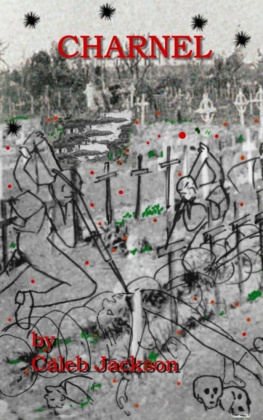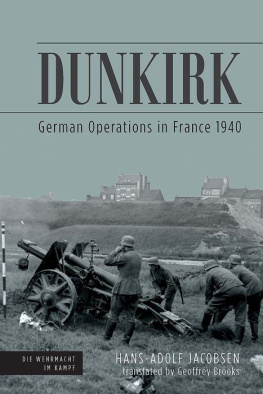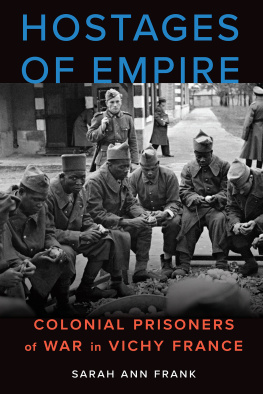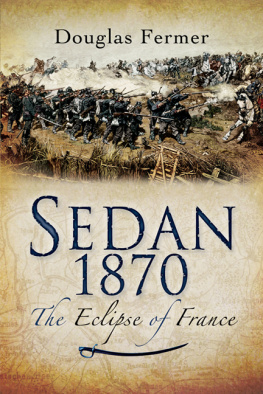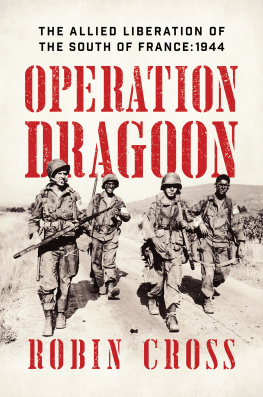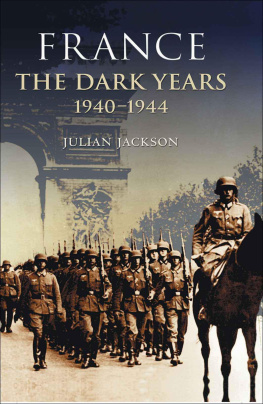THE FALL OF FRANCE
Julian Jackson is Professor of Modern History at Queen Mary and Westfield, University of London, and the author of several books on twentieth-century France, including France: The Dark Years 19401944 (OUP, 2001), and editor of Europe 19001945 (OUP, 2002).
THE FALL OF FRANCE
The Nazi Invasion of 1940
JULIAN JACKSON


Great Clarendon Street, Oxford OX2 6DP
Oxford University Press is a department of the University of Oxford.
It furthers the Universitys objective of excellence in research, scholarship,
and education by publishing worldwide in
Oxford New York
Auckland Bangkok Buenos Aires Cape Town Chennai
Dar es Salaam Delhi Hong Kong Istanbul Karachi Kolkata
Kuala Lumpur Madrid Melbourne Mexico City Mumbai Nairobi
So Paulo Shanghai Taipei Tokyo Toronto
Oxford is a registered trade mark of Oxford University Press
in the UK and in certain other countries
Published in the United States
by Oxford University Press Inc., New York
Julian Jackson 2003
The moral rights of the author have been asserted
Database right Oxford University Press (maker)
First published 2003
First published as an Oxford University Press paperback 2004
All rights reserved. No part of this publication may be reproduced,
stored in a retrieval system, or transmitted, in any form or by any means,
without the prior permission in writing of Oxford University Press,
or as expressly permitted by law, or under terms agreed with the appropriate
reprographics rights organizations. Enquiries concerning reproduction
outside the scope of the above should be sent to the Rights Department,
Oxford University Press, at the address above
You must not circulate this book in any other binding or cover
and you must impose this same condition on any acquirer
British Library Cataloguing in Publication Data
Data available
Library of Congress Cataloging in Publication Data
Data available
ISBN 0192805509
1 3 5 7 9 10 8 6 4 2
Typeset in Janson by RefineCatch Limited, Bungay, Suffolk
Printed by TJ International Ltd., Padstow, Cornwall
To Douglas
THE MAKING OF THE MODERN WORLD
This group of narrative histories focuses on key moments and events in the twentieth century to explore their wider significance for the development of the modern world.
PUBLISHED:
The Fall of France: The Nazi Invasion of 1940, Julian Jackson
FORTHCOMING:
A Bitter Revolution: Chinas Struggle with the Modern World, Rana Mitter
The Vietnam Wars: A Global History, Mark Bradley
Algeria: The Undeclared War, Martin Evans
The Burning of Louvain, Alan Kramer
SERIES ADVISERS:
PROFESSOR CHRIS BAYLY, University of Cambridge
PROFESSOR RICHARD J. EVANS, University of Cambridge
PROFESSOR PAUL PRESTON, London School of Economics
PROFESSOR DAVID REYNOLDS, University of Cambridge
PROFESSOR MEGAN VAUGHAN, University of Cambridge
Acknowledgements
Most of this book was written in a sabbatical semester in the autumn of 2001, and I would like to thank my Head of Department, Professor Noel Thompson, for granting me this leave. In some form or other I have taught a Special Subject on the Fall of France in Swansea History Department for the last fifteen years. Some years have worked better than others, but overall I have learnt a lot from the experience and enjoyed it (as I hope the students have as well). I have profited enormously from conversations, electronic or otherwise, with Martin Alexander, Peter Jackson, and Talbot Imlay. Talbot Imlay was kind enough to show me some sections of his forthcoming book on the Phoney War. I am grateful to Katharine Reeve, my editor at OUP, for her comments and advice. I am grateful also to Patrick Higgins for taking the time to read the whole manuscript with great care. This is certainly a much better book as a result of his criticisms and suggestions. Perhaps it would be a better one still if I had listened to all of them. Finally, I would like to thank Eleanor Breuning who generously gave up hours of her time to read through the proofs. Her heroic labours and vigilant eye saved me from more than mere typographical errors.
J.J.
Contents
List of Illustrations
Bibliothque nationale de France, Paris
Imperial War Museum (HU.3799)
Rue des Archives
Meuse at Bouvignes north of Dinant
Bildarchiv des Bundesarchivs
Bildarchiv des Bundesarchivs
deserted roads; at others they found themselves driving past columns
of refugees or even troops marching in the opposite direction
ECPAD/France
Keystone
encircled in the north at the end of May
Royal Army Museum Collections, Brussels
AKG London
Keystone
First appeared in Gringoire, 30/09/38
Keystone
16. Reynaud with his three nemesesPaul Baudouin, General Weygand, and Marshal Ptain
Keystone
Keystone
Rue des Archives
Keystone
(top) Keystone; (bottom) AKG London
Keystone
LAPI/Roger-Viollet
Keystone
First appeared in Gringoire, 18/01/38
AKG London
Roger-Viollet
Photos12.com/ARJ
Ouvrire on 8 January 1964
La Nouvelle Vie Ouvrire
The publisher and the author apologize for any errors or omissions in the above list. If contacted they will be pleased to rectify these at the earliest opportunity.
List of Maps
Brief Chronology
1934
6 February: Stavisky riots in Paris
1935
1114 April: Stresa Conference
18 June: Anglo-German Naval Agreement
2 October: Italian invasion of Abyssinia
1936
7 March: Germany reoccupies Rhineland
3 May: Popular Front wins French elections
September: French rearmament programme approved
14 October: Belgium ends military alliance with France
1938
10 April: Daladier becomes premier
2830 September: Munich agreement signed
30 November: General strike protesting against end of 40-hour week
1939
1516 March: Germany occupies the rest of Czechoslovakia
31 March: Anglo-French guarantee to Poland
23 August: Nazi-Soviet Non-Aggression Pact concluded
3 September: France and Britain declare war on Germany
30 November: Soviet invasion of Finland
1940
10 January: Mechelen incident
12 March: Soviet-Finnish Armistice
9 April: Germany invades Norway
10 May: Germany invades the Netherlands, Belgium, and Luxembourg
13 May: German troops cross Meuse at Sedan
51 May: Anglo-French forces in Belgium begin retreat
16 May: Churchill in Paris
18 May: Reynaud reshuffles government and brings in Ptain
19 May: Weygand replaces Gamelin as Commander-in-Chief
20 May: German troops reach Channel at Abbeville
21 May: Weygand visits Ypres
22 May: French and British leaders accept Weygand Plan
25 May: Armistice first mentioned in French War Committee
26 May: Reynaud visits London; Gort decides to withdraw towards Channel
28 May: Capitulation of Belgium
26 May4 June: Dunkirk evacuation
5 June: Reynaud reshuffles government; Daladier goes and de Gaulle comes in
57 June: German army breaks through Somme/Aisne line
Next page




